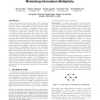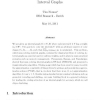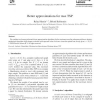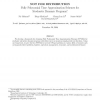111
click to vote
AAAI
2012
13 years 4 months ago
2012
We consider the classic cake cutting problem where one allocates a divisible cake to n participating agents. Among all valid divisions, fairness and efficiency (a.k.a. social wel...
139
click to vote
CORR
2012
Springer
13 years 9 months ago
2012
Springer
In many information networks, data items – such as updates in social networks, news flowing through interconnected RSS feeds and blogs, measurements in sensor networks, route u...
207
click to vote
SIAMCOMP
2011
14 years 4 months ago
2011
We consider the Minimum Linear Arrangement problem and the (Uniform) Sparsest Cut problem. So far, these two notorious NP-hard graph problems have resisted all attempts to prove in...
169
click to vote
PODS
2011
ACM
14 years 4 months ago
2011
ACM
In deletion propagation, tuples from the database are deleted in order to reflect the deletion of a tuple from the view. Such an operation may result in the (often necessary) del...
125
click to vote
ICALP
2011
Springer
14 years 5 months ago
2011
Springer
We are given an interval graph G = (V, E) where each interval I ∈ V has a weight wI ∈ R+. The goal is to color the intervals V with an arbitrary number of color classes C1, C2...
143
click to vote
IPL
2000
15 years 1 months ago
2000
We combine two known polynomial time approximation algorithms for the maximum traveling salesman problem to obtain a randomized algorithm which outputs a solution with expected va...
125
click to vote
SODA
2008
ACM
15 years 3 months ago
2008
ACM
We develop a framework for obtaining Fully Polynomial Time Approximation Schemes (FPTASs) for stochastic univariate dynamic programs with either convex or monotone single-period c...
117
click to vote
ISLPED
2007
ACM
15 years 3 months ago
2007
ACM
We address power minimization of earliest deadline first and ratemonotonic schedules by voltage and frequency scaling. We prove that the problems are NP-hard, and present (1+ ) f...
112
click to vote
APPROX
2008
Springer
15 years 4 months ago
2008
Springer
Abstract. In this paper, we propose a general framework for designing fully polynomial time approximation schemes for combinatorial optimization problems, in which more than one ob...
139
click to vote
ISAAC
2000
Springer
15 years 5 months ago
2000
Springer
It has been a challenging open problem whether there is a polynomial time approximation algorithm for the Vertex Cover problem whose approximation ratio is bounded by a constant l...




